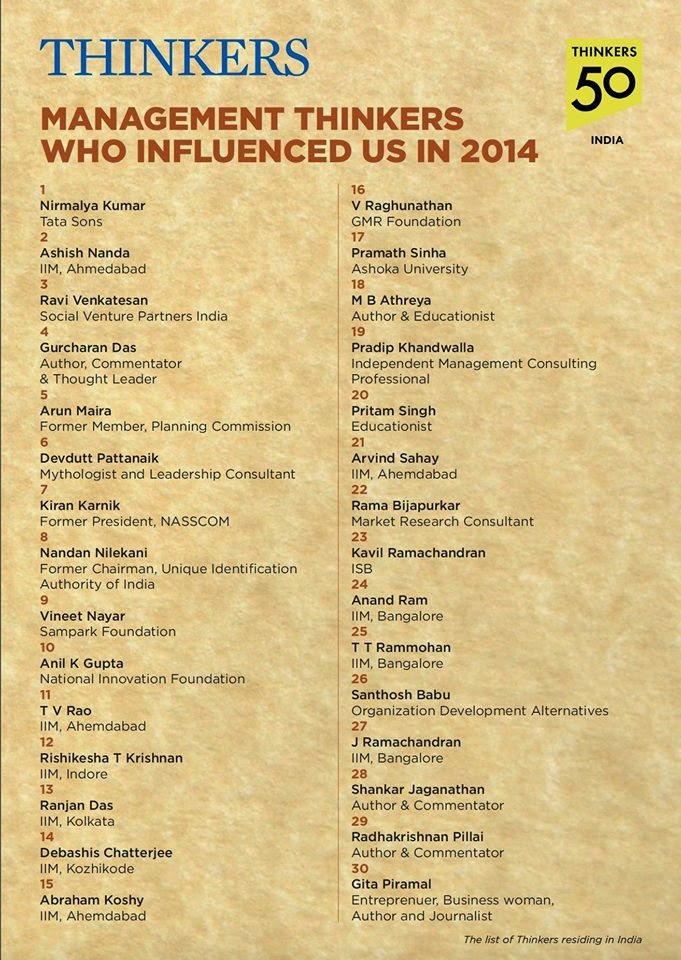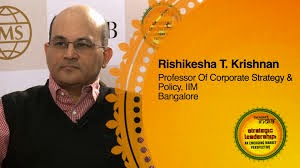I have never been totally comfortable with the concept of
Corporate Social Responsibility, particularly in India. Somehow, it always
seemed to me that CSR provided an opportunity for companies to get away with
various transgressions by making a big show of giving back to society, akin to
the biggest crook in town giving the largest donations to the local temple.
But, don’t companies have to be responsible first before
they can become socially responsible? Isn’t corporate responsibility an essential
part of the social contract under which business operates?
What do I mean by corporate responsibility? Following the
laws of the land. Paying taxes regularly. Not trying to find convoluted ways of
avoiding taxes. Not knowingly causing harm to anyone. Not exploiting the weak,
whether they are employees or members of the community.
Its noteworthy that even that apostle of free markets and
unbridled capitalism, Milton Friedman, wrote that "there
is one and only one social responsibility of business–to use its resources and engage
in activities designed to increase its profits so long as it stays within the
rules of the game, which is to say, engages in open and free competition
without deception or fraud."
That is what corporate responsibility should be at a minimum
– staying within the rules of the game, not practicing deception or fraud.
Clear Hold Build
This perspective on corporate responsibility was only
strengthened when I read Sudeep Chakravarti’s recent book Clear Hold Build:
Hard Lessons of Business and Human Rights in India (HarperCollins, 2014).
In this book, Sudeep demonstrates how some of India’s
largest corporate groups (and some foreign ones as well) have worked with the
State to access raw materials like iron ore and bauxite from some of India’s
poorest regions without following the laws of the land concerning environmental
clearances, local public hearings, compensation, resettlement and
rehabilitation. These are of course the very same areas that are at the centre
of social conflict and often under the grip of maoist forces.
Many years ago, I spoke to one of
India’s leading industrialists and asked him about competition from China. He was
worried that Indian business might lose out since the Chinese entrepreneur is
greedy for growth while the Indian entrepreneur is easily satisfied. Looking at
the apparent willingness of Indian businessmen to operate in areas with high
levels of social conflict, I wonder whether that distinction he made between
Indian and Chinese entrepreneurs is true today!
Chattisgarh is one of the key
states where such social conflicts exist. Until I visited Raipur recently, my
image of Chhatisgarh was of a beautiful but poor state. That image got rattled
when I realized that Raipur has many of the top hotel brands with sparkling new
hotels. At the hotel where I was staying (incidentally, not one of the biggest
brands) I saw lavish birthday parties being thrown for small kids; many of the
cars parked outside were BMWs and Mercs. Mining and construction are the main
sources of such wealth, I was told!
Not an Indian problem alone?
Of course, to be fair,
irresponsible corporate behavior is not unique to India. In recent years,
leading global automobile and pharmaceutical companies have been revealed to
suppress adverse safety data and sell products that they knew were not
completely safe. Some of the top apparel labels turned a blind eye to thousands
of workers employed by their contractors working in obviously unsafe conditions
in Bangladesh till a couple of major fire accidents forced them to take
corrective action.
The Role of the State
Clear Hold Build paints an
unflattering picture of business in India, but the State comes out looking even
worse. I recall reading Death in the
Andes, Mario Vargos Llosa’s evocative account of exploitation by a mining
company many years ago. When I read that book, I never imagined that such behavior
could be emulated in a democratic country such as ours. But, there is
increasing evidence of exactly that – besides this book, for a graphic account,
see Paranjoy Guha Thakurta’s documentary Blood and Iron on illegal mining in
Bellary. The State which should have been the protector of individual rights is
not just a silent spectator but often an active participant in such loot, and
in extreme situations the State is taken over by the exploiters themselves as
we saw for a few years in Karnataka.
The saving grace is that in a
democracy the electoral process ultimately catches up with the exploiters. The then
ruling parties in the states paid a heavy price for what happened in Nandigram/Singur
and Bellary respectively. But, not before a lot of damage was done to the local
people, their land and their livelihoods.
Companies need to Develop New
Capabilities
If companies are to become more
responsible and respectful of human rights as Sudeep Chakravarti demands, they
need to develop a new set of capabilities. For example, under the new Land Acquisition
Act, companies will no longer be able to rely on the State using its powers of
eminent domain to acquire land for their new factories. Companies will have to
work with local communities and convince landowners to sell their land to the
company.
As Beardsley et. al. wrote in
their article “A New Era for Business” in Stanford Social Innovation Review
(Summer 2007), companies will increasingly have to factor socio-political
issues into their strategic decision-making process. This would mean company
CEOs and senior managers would have to engage more with these issues, and with NGOs,
communities, and other actors involved in the process of social policy
formulation.
Tailpiece
Debate and discourse in India has been richer for those who
have veered off the beaten track and explored our soft underbelly. Sudeep
Chakravarti is certainly one of these explorers. Starting in traditional
business journalism, he is today an expert on the maoist movement in India and
the regions most affected by this phenomenon. In this book, he brings together
his understanding of business and social conflict in a way that few others can.
[The views expressed here are the personal views of the
author.]




















Enjoyed reading the article! Looks like one of those wicked problems. I wonder if growth imperative and greed are connected? Milton Friedman's 'Though shall play by the rules' looks like a teacher preaching in the class. Will read the book. Thanks for sharing.
ReplyDelete